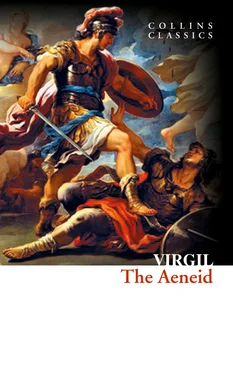When Virgil died, in 19 BCE, he was still in the process of editing his masterpiece and wanted the manuscript to be destroyed. However, Augustus, the first emperor of the Roman Empire, ordered that the manuscript should be published and that it should be as true to Virgil’s final edit as possible. As a result, literary scholars consider a few of the lines to be work in progress, because they do not obey the dactylic hexameter. It seems that Virgil worked by first drafting his poetry in rough form, just to flesh out the story, and then painstakingly honed his words until they dropped into his chosen poetic template.
Virgil apparently took around ten years to complete The Aeneid . Although Virgil was not content with its form upon his death, Emperor Augustus saw enormous propaganda value in the work. It became part of the branding package that enabled the Romans to expand their empire and to continue governing it over such a vast expanse of territory. The Aeneid reminded Romans, both distant and near, to be proud of their heritage and to maintain their allegiance to the emperor, because they, like he, were descended from greatness.
The same legend told in prose would not have had the same impact as Virgil’s poetic work, because it needed to be both entertaining and informative. Saving Virgil’s work and sharing it widely meant that public performances could be held across the empire, where communities came together to share the experience. That way there could be no excuse for new generations, who might have never been anywhere near Rome, to think of themselves as anything but Roman. It was a cultural meme that served to keep everyone in the same meme pool – young and old, male and female, rich and poor. The message was that one didn’t need to live or have been raised in Rome to be Roman. All that mattered was that allegiance to Rome was perpetuated via exposure to education about the Roman legend. It was a cultural franchise that continued to work extremely well for a few hundred years after the lives of Virgil and Augustus.
Contents
Title Page THE AENEID Virgil
History of Collins History of Collins In 1819, millworker William Collins from Glasgow, Scotland, set up a company for printing and publishing pamphlets, sermons, hymn books and prayer books. That company was Collins and was to mark the birth of HarperCollins Publishers as we know it today. The long tradition of Collins dictionary publishing can be traced back to the first dictionary William published in 1824, Greek and English Lexicon . Indeed, from 1840 onwards, he began to produce illustrated dictionaries and even obtained a licence to print and publish the Bible. Soon after, William published the first Collins novel, Ready Reckoner ; however, it was the time of the Long Depression, where harvests were poor, prices were high, potato crops had failed and violence was erupting in Europe. As a result, many factories across the country were forced to close down and William chose to retire in 1846, partly due to the hardships he was facing. Aged 30, William’s son, William II took over the business. A keen humanitarian with a warm heart and a generous spirit, William II was truly ‘Victorian’ in his outlook. He introduced new, up-to-date steam presses and published affordable editions of Shakespeare’s works and The Pilgrim’s Progress , making them available to the masses for the first time. A new demand for educational books meant that success came with the publication of travel books, scientific books, encyclopaedias and dictionaries. This demand to be educated led to the later publication of atlases and Collins also held the monopoly on scripture writing at the time. In the 1860s Collins began to expand and diversify and the idea of ‘books for the millions’ was developed. Affordable editions of classical literature were published and in 1903 Collins introduced 10 titles in their Collins Handy Illustrated Pocket Novels. These proved so popular that a few years later this had increased to an output of 50 volumes, selling nearly half a million in their year of publication. In the same year, The Everyman’s Library was also instituted, with the idea of publishing an affordable library of the most important classical works, biographies, religious and philosophical treatments, plays, poems, travel and adventure. This series eclipsed all competition at the time and the introduction of paperback books in the 1950s helped to open that market and marked a high point in the industry. HarperCollins is and has always been a champion of the classics and the current Collins Classics series follows in this tradition – publishing classical literature that is affordable and available to all. Beautifully packaged, highly collectible and intended to be reread and enjoyed at every opportunity.
Life & Times Life & Times Virgil as Propagandist The Roman poet Virgil (70–19 BCE) lived and died during the period of transition from Roman Republic to Roman Empire. It was a time when Romans saw the potential in expanding their territory to gain access to material resources and to enslave other peoples for manpower. The success of the burgeoning Roman Empire relied in part on a sort of branding, and this is where Virgil’s work had its greatest significance. The Aeneid is an epic poem, telling the legendary story of the genesis of the Roman Republic several hundred years before the birth of the empire. It was the perfect tool to provide the empire with administrative cohesion, so that personnel in increasingly far-flung regions would still have the stamp of Roman identity. Had the Roman government not maintained its hold on the expanding empire by promoting and perpetuating the Roman brand, the empire would surely have fragmented far sooner than it eventually did, some 350 years on, in BC 330. Just as the Christians would soon have Adam as their progenitor, so Virgil gave the Romans their progenitor in the shape of Aeneas, a Trojan who travelled from Troy, in present-day Turkey, to Italy. The character Aeneas was already known to the Romans from the story of the The Iliad , written by the ancient Greek poet Homer. In The Iliad , Aeneas is the heroic son of prince Anchises and the goddess Aphrodite (Venus). Following the destruction of Troy by the Greeks, Aeneas finds himself with no fixed abode, which is the catalyst for his wanderings. Virgil took the thread of this minor subplot within The Iliad and expanded upon it to create the legend of Aeneas becoming the ancestor of all Romans. During Virgil’s upbringing, many myths and legends mentioning Aeneas circulated among the story-tellers and scholars of Rome. A century before Virgil, Cato the Elder had written an account of the origins of the Romans, titled Origines , which began the process of providing Rome with its historical branding. So, Virgil was nurtured in a social environment with a keen appetite for tales of Roman pedigree. It made perfect sense to transform the hero Aeneas into the man from whom all Romans could claim descent. Of course, there may also have been some truth to the legend, as it may be that a number of displaced Trojans did indeed find their way to the Italian peninsula.
Book I
Book II
Book III
Book IV
Book V
Book VI
Book VII
Book VIII
Book IX
Book X
Book XI
Book XII
Classic Literature: Words and Phrases adapted from the Collins English Dictionary
Copyright
About the Publisher
Arms, and the man I sing, who, forc’d by fate,
And haughty Juno’s unrelenting hate,
Expell’d and exil’d, left the Trojan shore.
Long labors, both by sea and land, he bore,
And in the doubtful war, before he won
The Latian realm, and built the destin’d town;
Читать дальше












